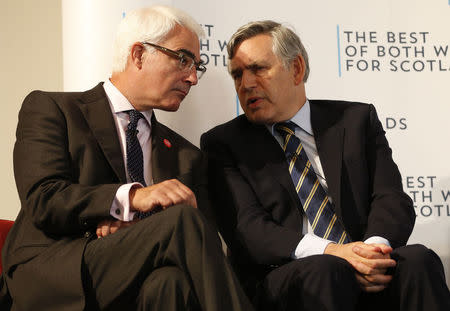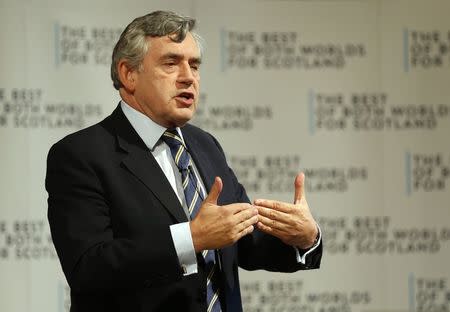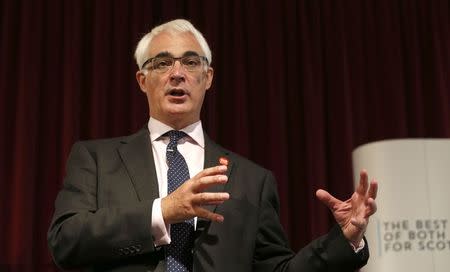Former PM Brown sets aside feud to fight Scottish independence
By Alistair Smout DUNDEE (Reuters) - Former British prime minister Gordon Brown set aside a long-running feud on Wednesday to urge Scots to reject independence in his first public appearance with Alistair Darling, the leader of the campaign to keep Scotland part of the United Kingdom. With three weeks to go before a historic independence referendum on Sept. 18, the two Labour party politicians, who fell out while in government from 2007-10, appeared in Dundee to argue that Scotland would be better off staying in the union. They spoke as postal voting got underway and as the campaign intensifies with independence supporters struggling to catch up with their rivals in the polls even though their leader, Alex Salmond, won a final TV debate on Monday. Polls show the pro-independence camp is on average 14 percentage points behind the anti-independence side. Darling was Britain's finance minister from 2007 to 2010 under Brown, but his comments on the 2008 financial crisis and subsequent criticism of Brown's leadership soured relations between the two. However, the two men were full of praise for each other and their respective efforts to stop Scotland from severing a 307-year tie with England when they addressed a crowd of several hundred people at Caird Hall, Dundee's main concert venue. Referring to Brown as "my good colleague", Darling said the former British prime minister, who has previously made numerous speeches arguing against independence, had campaigned tirelessly. Brown said it was "a real pleasure" to speak alongside a man he has hardly spoken to since leaving office. "We've got the confidence and we've got the arguments," Darling told the audience. "We’re not just voting in a government for the next five years, that’s what happens in general elections. We are voting for the future of our country. The nationalists only need to win once, by one vote, and that’s enough. We need to win well, and we will win well." Both men urged postal voters to focus on the uncertainty that a vote for independence would bring with no clear decision on what currency would be used in an independent Scotland and warned of the possible impact on pensions and public services. Brown said Scotland was far better off as part of the United Kingdom with England, Wales and Northern Ireland. "We should vote not for a nationalist vision of Scotland’s future, but for a patriotic vision of a Scotland playing its full part in Britain and in the world," he said. Their joint appearance came as more than 100 business leaders joined forces in the biggest intervention by Britain's business community in the referendum debate so far, signing a letter to oppose Scotland ending its 307-year ties with England. "As job creators, we have looked carefully at the arguments made by both sides of the debate," the letter said. "Our conclusion is that the business case for independence has not been made." (Writing by Belinda Goldsmith; Editing by Andrew Osborn)



